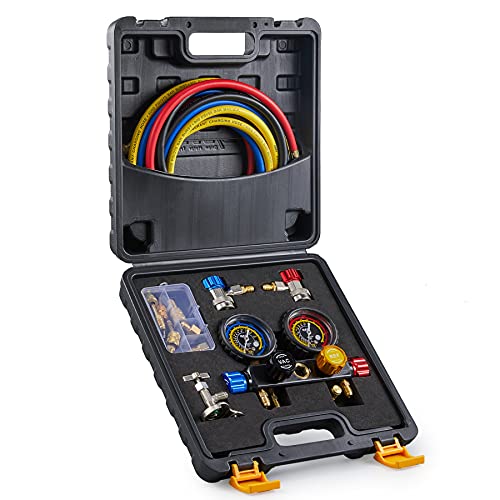AC Pro gauge type is a type of digital gauge, making it very effective in giving accurate readings on your automotive AC. The gauge has four different colors, and you might wonder what it means when it is in yellow. After inquiring from experts, we found answers.
If you notice the AC Pro gauge in yellow, it's an alert sign notifying you that your AC system is overcharged. As for the other colors, green means your AC has enough refrigerant, and red warns of a different problem and that you should contact an expert.
White, of course, indicates that your car's AC is low on refrigerant. An AC Pro gauge does more the give pressure readings. Read further for a detailed discussion if you are unfamiliar with the colors and other uses of the gauge.
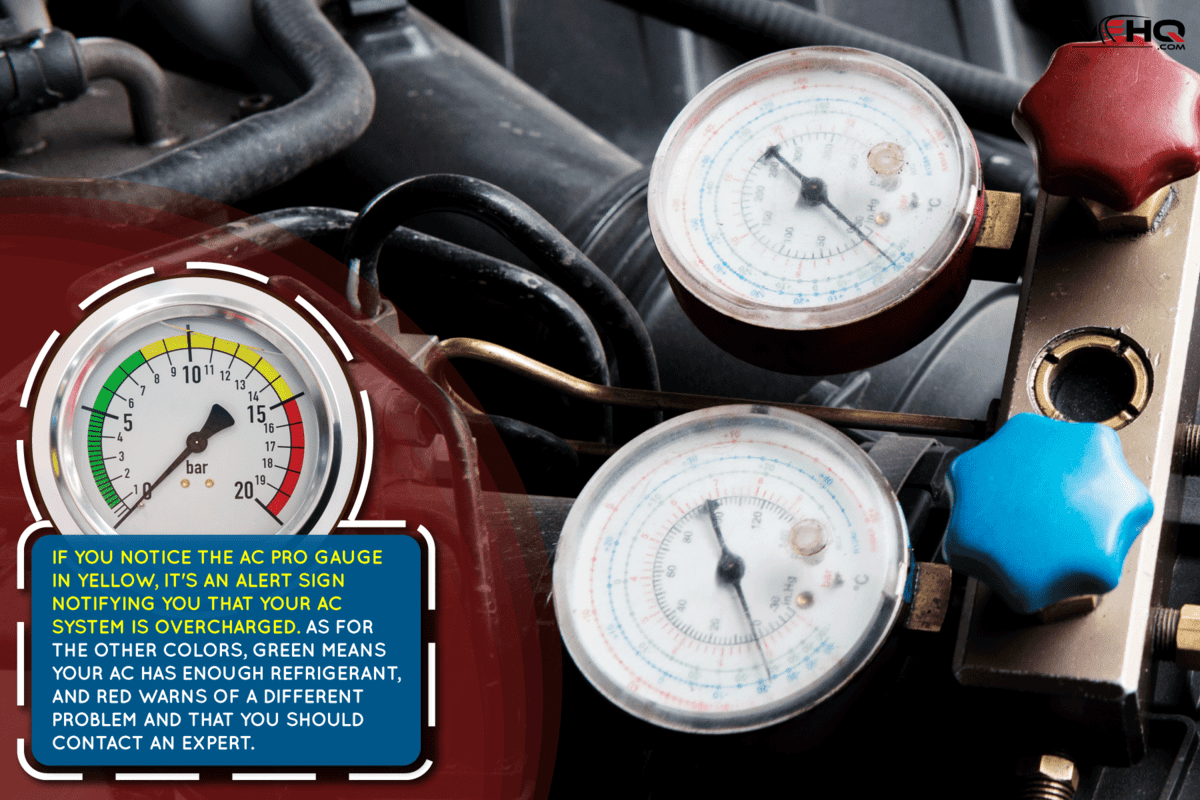
Decoding AC Pro Gauge In Yellow
It can be very frustrating when your automotive air conditioning system breaks down, especially during hot weather. You can drive with your windows down, but this only provides some relief.
Don't panic if the needle on the gauge stops at the yellow. This indicates a possible overcharge on your air conditioning system. An overcharged automotive AC system doesn't effectively cool due to the liquid in the system not having enough space to depressurize.
While the immediate downside is that the AC system blows out hot air, you should still immediately contact your dealer/mechanic to fix the issue before it leads to further damage to your car system and other vehicle parts.
Other AC Pro Gauge Colors Interpreted
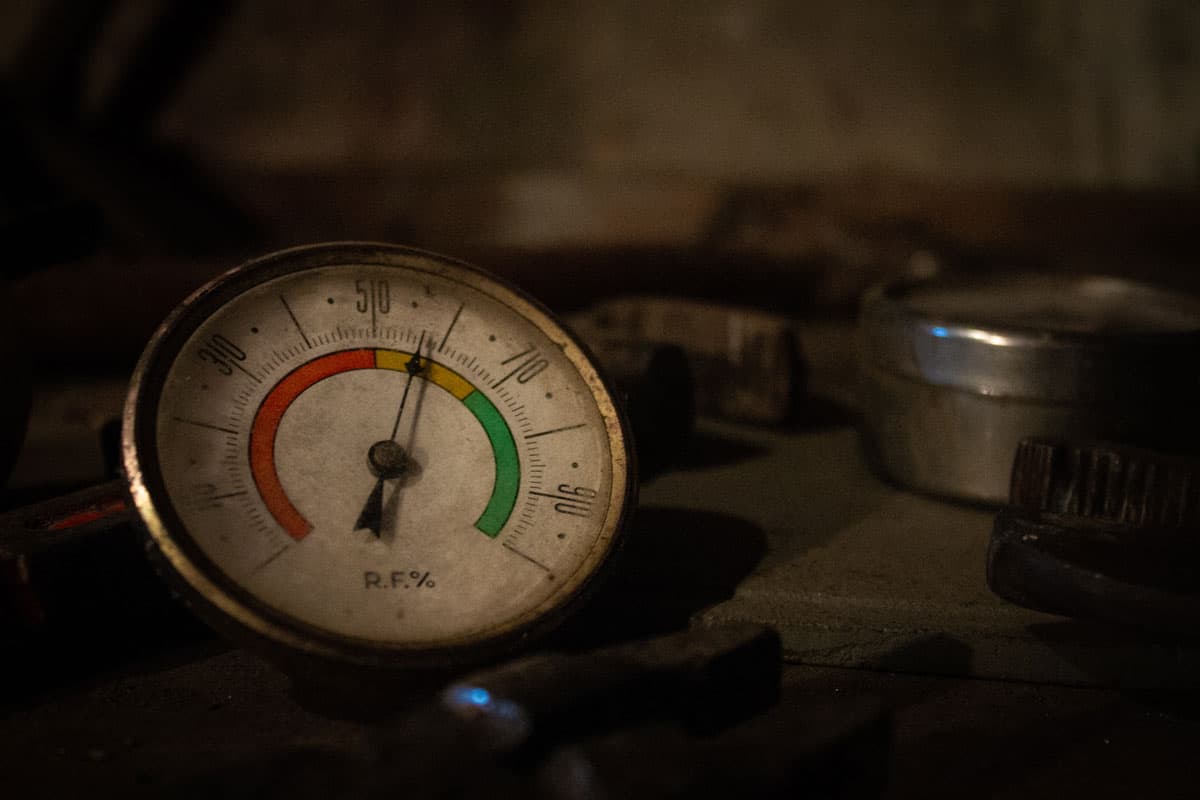
An AC Pro gauge has other colors you shouldn't overlook. They are white, red and green.
White
As indicated on the gauge, white means you have low refrigerant, and an immediate top-up is necessary.
Green
When the needle sits in the green part, it simply means that the AC system is ok and has enough refrigerant to run it.
Red
When in the red zone, do not add the refrigerant because the system could have other underlying problems. You can start by diagnosing the AC system to see the exact problem. Ensure to contact your mechanic if you are not sure about the steps to take to fix the issue.
https://www.istockphoto.com/photo/professional-car-mechanic-servicing-car-air-conditioner-car-repair-shop-gm1436678092-477657072?phrase=freon%2Bgauge
What Happens When Your AC Has Too Much Refrigerant?
In the hot months, you first thing you want to do before starting your drive is crank up the car's AC to cool it. If you have enough refrigerant is enough, you shouldn't have the following issues.
- AC isn't cooling: Too much Freon won't allow the AC to function, and no cool air will come from it.
- Noisy engine: Excess Freon will require the engine to work harder, resulting in a loud engine during acceleration. Read this post for information on Freon. Freon Leak In Car-Is It Dangerous? What To Do?
- A loud compressor: Gushes of the refrigerant will cause the compressor to be noisy. The noise will come out of the AC vents.
- Erroneous readings: When you finally decide to use the gauge, the overflowing Freon will give high readings, which aren't ideal for your AC.
How To Use An AC Pro Gauge
To"> determine the pressure of your car's AC with a Pro gauge, you need to unscrew the car's low-pressure port to the gauge's coupler. The vehicle's AC should be running on maximum.
If the compressor shows a low reading, you should top it up. Connect the AC Pro can containing refrigerant to the gauge and fill it until the needle is green.
Click here to see this AC kit on Amazon.
How Does An AC Gauge Work
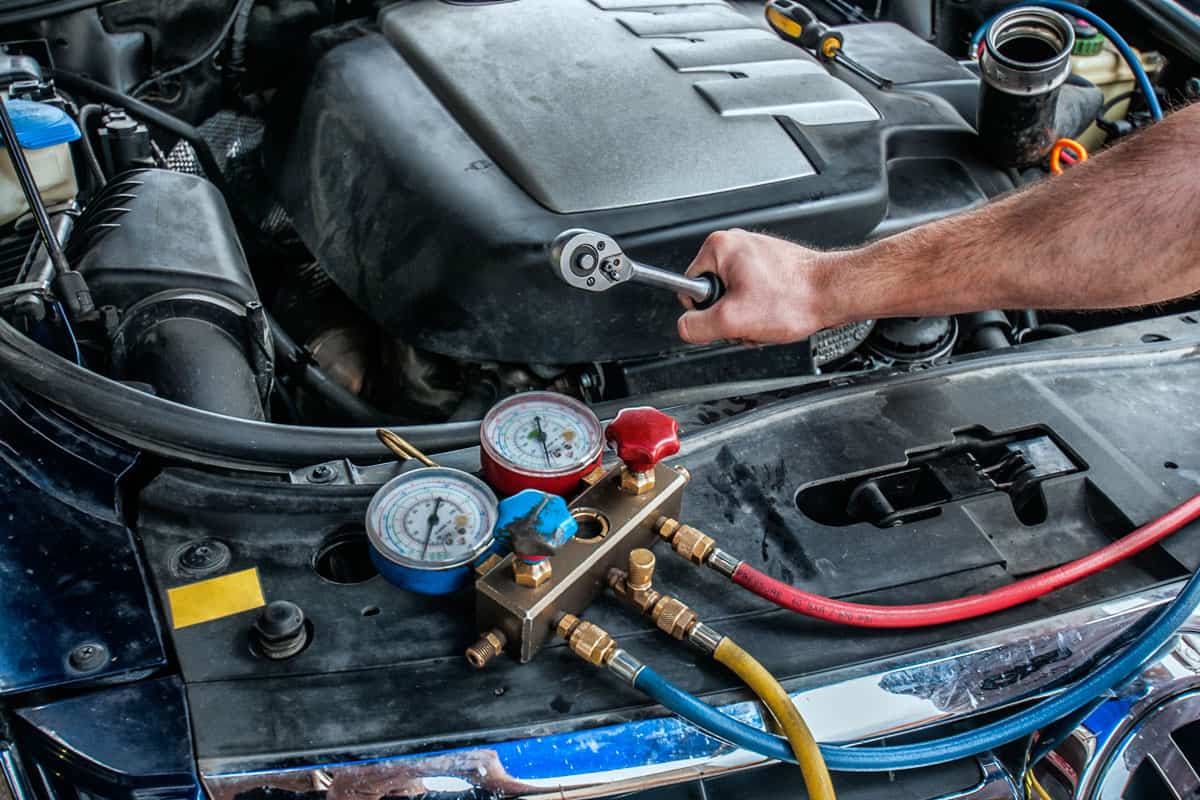
An HVACR system has several operational components that require routine maintenance inspection. An AC gauge is critical for any automobile owner or auto mechanic as it eliminates the need for guesswork when checking a car's A/C system.
It will also enable you to carry out tasks like;
- Getting rid of any dirty refrigerants that could endanger the entire system.
- Helping release any trapped moisture or sludge.
- Adding refrigerant to the AC systems.
- Checking the pressure of the refrigerant in the system to see if it's too high or low.
- Locating the cause of leaks.
What Is The Ideal PSI On AC Pro Gauge?
The AC Pro gauge helps you know the pressure in your vehicle's air conditioning system. PSI readings identify issues with the car's system and must be attended to immediately. The highest PSI should be 150, and the lowest is 30 for a properly working system.
Types Of Gauges
Knowing the alternative AC gauge sets available in the market is very important. Automobile air conditioning gauges are available in several variants.
Some of the more typical kinds are;
2 Manifold Valve
These AC gauge sets use two valves, one for the high-pressure side and the other for the low-pressure side. These gauge sets perform all the tool operations, but you must change the hoses to fit the specific task.
4 Manifold Valve
This type comes with four hose connectors and four shut valves. The design enables multiple uses without requiring you to change the hose. It helps service the AC system more thoroughly than you can with two-valve systems.
Check out this four-valve AC gauge on Amazon.
Digital AC Gauge Set
These gauges use digital screens and cost more than analog models. However, readings from a digital gauge are more accurate than analog options. You can connect them to smartphones with their Bluetooth connectivity. Auto specialists often use them because they offer extra features.
Analog AC Gauge Set
The most popular type of gauge set is an analog set that uses dial gauges. It features an indicator needle that displays the amount of vacuum or pressure in an air conditioning system or other machinery.
Analog sets are more cost-effective and cheaper than digital ones. While they don't offer a lot of readings, their streamlined approach can be more accessible to newer users.
Choosing An AC Gauge

When selecting your vehicle's AC gauge, it is critical to ensure it has the features necessary to endure field use, such as;
- Waterproof- It should be water resistant.
- Having a heavy-duty casing-Look for a device with an aluminum or brass body. These kinds of metals are strong and resilient.
- A strengthened hook.
- A gauge muffled by silicone but always ensure that you purchase a gauge with a color-coded scale.
- The hoses are another essential factor. The hose on the gauge should be at least five feet long.
- A gauge with superheating and cooling functions is also another excellent choice.
- An impact-resistant screen. Benefits include extra features like data logging and well-placed thermocouple ports.
Advantages Of An AC Pro Gauge
As you know, change is inevitable, and there are more and more innovations meaning you have no choice but to embrace them. However, technological change has its benefits.
Nowadays, the focus is more on digital AC gauges than analog ones. It doesn't mean you should throw away your analog AC gauge; it's far from that. You will realize that the digital gauge advantages outweigh those of the analog one.
Some of the advantages are;
- They come with various refrigerants, allowing the technicians to evaluate them with just one gauge.
- Some manufacturers include diagnostic software with the set to make troubleshooting and reading interpretation even easier.
- Conversion tables, used with analog meters, are no longer available.
- Since data processing is based on the intelligence of circuit boards and processor chips, digital gauges are more precise.
- Temperatures, sub-cool, pressures, and superheat readings are all displayed simultaneously.
- Since only one instrument is needed, the long-term investment is worthwhile.
- Most include wireless connectivity, enabling data streaming to portable devices.
- Most can directly plug a vacuum gauge into the AC system gauge.
Which Refrigerant Can You Use With AC Pro Gauge?
AC Pro gauge uses self-sealing and sealed cans. The refrigerant that AC Pro uses is R134a. However, other refrigerants can substitute the R134a. These are R-1234yf, R744, and R-152. Manufacturers have made substitutes for consumers in case they run out of the refrigerant they use or if it isn't available.
Read this post for more details. How To Use R134A Refrigerant
Click here to see this AC Pro hose adapter on Amazon.
How Long Do AC Recharges Last?
Car air conditioners are primarily used during the hot weather, so the AC's refrigerant can last for a good three years. The period is accurate if there are no leaks or loss of pressure in the system. If your vehicle's low on refrigerant, remove the remainder and clean the system before you refill it.
Winding Up
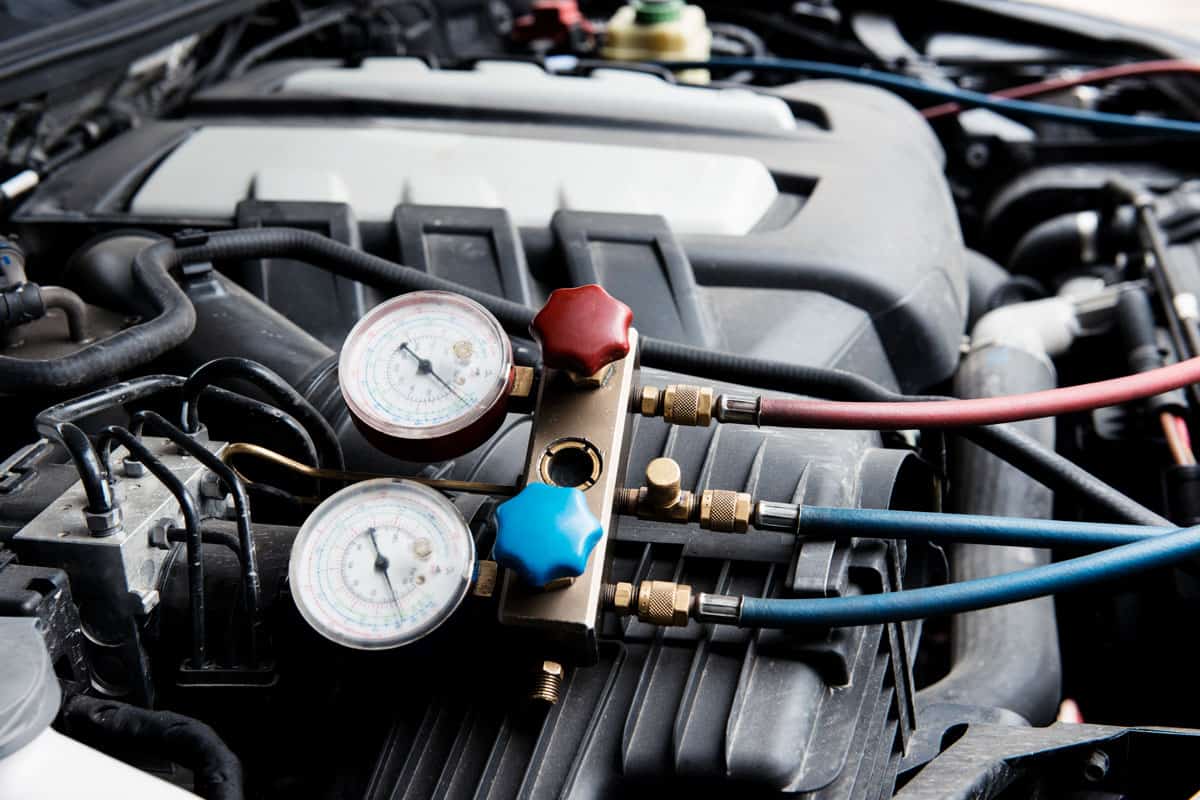
An AC Pro gauge is vital when it comes to identifying and repairing malfunctioning air condition systems. You now know what happens when the gauge needle points at the various color zones on the gadget. Spotting the problem of your vehicle's AC when it arises is easy.
To prevent further harm to the AC system and other parts of the car, address any issues immediately before they lead to more severe problems.
Here are some posts that can help you with overall vehicle air conditioning maintenance.


